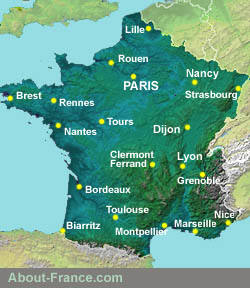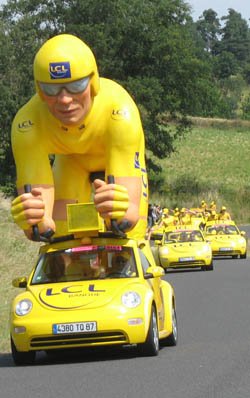- Explore France ►
- KEY PAGES
- Where to go
- How to get there
- Learn about France
French verbs: the present tense
Forms and use of the present tense in French
There is just one single present tense in
French, unlike in English where the present tense has two different
forms, the
present simple and the present progressive, The Present Tense in
French, le temps présent,
is used to express both momentary action and progressive action. In the
rare cases where ambiguity could be possible, French needs more than
just a tense change to clarify the implied meaning.
Thus the hypothetical English sentence: "I drink wine, but I'm not drinking wine" , which is understandable if unlikely, could become in French: "Je bois le vin mais je ne bois pas de vin," which is confusing to say the least.
Thus the hypothetical English sentence: "I drink wine, but I'm not drinking wine" , which is understandable if unlikely, could become in French: "Je bois le vin mais je ne bois pas de vin," which is confusing to say the least.
The present tense - le temps présent
This is used for expressing all forms of action taking place in present time.- ► It is the only tense for expressing present time.in French.
- ► In order to distinguish between momentary and progressive aspects of a present action (as, in English, between I eat and I am eating) French uses other devices. See below.
- ► Being the most common tense in everyday language, the present tense is also the tense where there are most irregularities.
| Verb | Present
tense |
|---|---|
| être | je suis, tu es, il est, nous sommes, vous êtes, ils sont |
| avoir | j'ai, tu as, il a, nous avons, vous avez, ils ont |
| pouvoir | je peux (or je puis), tu peux il peut, nous pouvons, vous pouvez, ils peuvent |
| devoir | je dois, tu dois, il doit, nous devons, vous devez ils doivent |
| porter (regular verbs in -er) |
je porte, tu portes, il porte, nous portons, vous portez, ils portent |
| finir (regular verbs in -ir) |
je finis, tu finis, il finit, nous finissons, vous finissez, ils finissent. |
| vendre
(regular verbs in -re) |
je vends, tu vends, il vend, nous vendons, vous vendez ils vendent |
| aller | je vais, tu vas, il va, nous allons, vous allez, ils vont |
| boire | je bois, tu bois, il boit, nous buvons, vous buvez, ils boivent |
| savoir | je sais, tu sais, il sait, nous savons, vous savez, ils savent |
| venir | je
viens, tu viens, il
vient, nous
venons, vous venez, ils viennent. |
| voir | je
vois, tu vois, il voit, nous voyons, vous voyez, ils
voient |
Note: 3rd person pronouns are: Singular: il, elle, on or ce ; Plural ils, elles, ce
Examples:
He likes wine but doesn't drink champagne.
- Il aime le vin mais ne boit pas de champagne.
The car is making a strange noise.
La voiture fait un bruit étrange.
When I'm eating snails, I think of France
Quand je mange des escargots, je pense à la France
He likes wine but doesn't drink champagne.
- Il aime le vin mais ne boit pas de champagne.
The car is making a strange noise.
La voiture fait un bruit étrange.
When I'm eating snails, I think of France
Quand je mange des escargots, je pense à la France
Stressing the "progressive" aspect
In order to stress
that an action is progressive
(i.e. ongoing), not instantaneous, French uses expressions rather than
a specific verb tense.
The most common way of stressing progressive aspect is to use the verb phrase "être en train de" (literally "to be in the process of"). So to stress the progressive aspect that is conveyed through tense usage in the English expression "He's swimming against the current", a French speaker will say :
"Il nage contre le courant", or "Il est en train de nager contre le courant".
Another alternative is to add an adverb of duration, such as "actuellement" (meaning "currently"), which will give:
"Il nage actuellement contre le courant".
However, there is often no need to stress the progressive aspect of a statement; most often, the context will be sufficiently explicit, so the aspect of the verb does not need to be indicated. Besides, some verbs such as vivre and savoir are by definition progressive. Even in English, we do not need to say "I am knowing".
The most common way of stressing progressive aspect is to use the verb phrase "être en train de" (literally "to be in the process of"). So to stress the progressive aspect that is conveyed through tense usage in the English expression "He's swimming against the current", a French speaker will say :
"Il nage contre le courant", or "Il est en train de nager contre le courant".
Another alternative is to add an adverb of duration, such as "actuellement" (meaning "currently"), which will give:
"Il nage actuellement contre le courant".
However, there is often no need to stress the progressive aspect of a statement; most often, the context will be sufficiently explicit, so the aspect of the verb does not need to be indicated. Besides, some verbs such as vivre and savoir are by definition progressive. Even in English, we do not need to say "I am knowing".
More
examples:
I live in Paris - Je vis à Paris
At present I'm living in Paris - Actuellement je vis à Paris
I'm writing a rather long paper - Je suis en train d'écrire une dissertation assez longue.
Right now I'm drinking cider - Actuellement je suis en train de boire du cidre.
It's breaking up on the rocks - Il est en train de se briser sur les rochers.
We're having dinner - Nous sommes en train de déjeuner / Nous déjeunons en ce moment
I live in Paris - Je vis à Paris
At present I'm living in Paris - Actuellement je vis à Paris
I'm writing a rather long paper - Je suis en train d'écrire une dissertation assez longue.
Right now I'm drinking cider - Actuellement je suis en train de boire du cidre.
It's breaking up on the rocks - Il est en train de se briser sur les rochers.
We're having dinner - Nous sommes en train de déjeuner / Nous déjeunons en ce moment
One instance in
which French uses a present tense where English does not is in time
clauses using "depuis"
(or synonyms) in the sense of "for"
or "since" in
relation to present time
While English uses a present perfect:
I've been here for two hours / He's been driving since breakfast
French uses "depuis" and a present tense
Je suis ici depuis deux heures / Il conduit depuis le petit déjeuner.
(In relation to past time, structures with depuis use a variety of past tenses, depending on the context: Examples :
Il travaillait depuis trois jours, quand il est tombé malade
Il n'a pas vu son frère depuis 35 ans.
While English uses a present perfect:
I've been here for two hours / He's been driving since breakfast
French uses "depuis" and a present tense
Je suis ici depuis deux heures / Il conduit depuis le petit déjeuner.
(In relation to past time, structures with depuis use a variety of past tenses, depending on the context: Examples :
Il travaillait depuis trois jours, quand il est tombé malade
Il n'a pas vu son frère depuis 35 ans.
More
examples:
We've been here for a week - Nous sommes ici depuis une semaine.
I've lived in New York since 1980 - Je vis à New York depuis 1980.
There haven't been any mice since we bought a cat -
Il n'y a plus de souris depuis que nous avons acheté un chat.
I haven't felt well since I ate that sausage -
Je ne me sens pas bien depuis que j'ai mangé cette saucisse.
(Note that it is the verb in the main clause that is in the present tense, not the verb in the subordinate clause.)
We've been here for a week - Nous sommes ici depuis une semaine.
I've lived in New York since 1980 - Je vis à New York depuis 1980.
There haven't been any mice since we bought a cat -
Il n'y a plus de souris depuis que nous avons acheté un chat.
I haven't felt well since I ate that sausage -
Je ne me sens pas bien depuis que j'ai mangé cette saucisse.
(Note that it is the verb in the main clause that is in the present tense, not the verb in the subordinate clause.)
► Other tenses: Expressing the future Past tenses Subjunctive tenses
Essential French words and phrases for travellers 25 essential words and 25 vital phrases
About-France.com
Online French Grammar
: Copyright
© About-France.com 2007 - 2023







